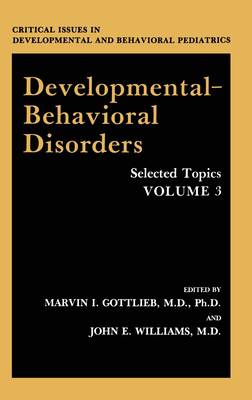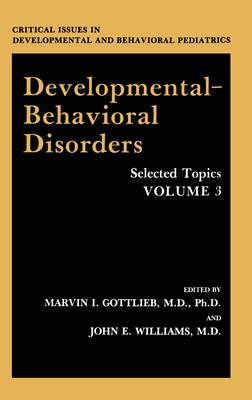
- Retrait gratuit dans votre magasin Club
- 7.000.000 titres dans notre catalogue
- Payer en toute sécurité
- Toujours un magasin près de chez vous
- Retrait gratuit dans votre magasin Club
- 7.000.0000 titres dans notre catalogue
- Payer en toute sécurité
- Toujours un magasin près de chez vous
Developmental-Behavioral Disorders
Selected Topics Volume 3
151,45 €
+ 302 points
Description
I. Introduction: General Issues in Developmental Disorders.- 1 State of the World's Children: Developmental-Behavioral Disorders in a Global Context.- 1. Introduction.- 2. Children in History.- 3. Children Today.- 4. Recent Nutrition Data.- 5. Children Tomorrow.- 6. Conclusions.- References.- 2 PL 99-457: A New Challenge and Responsibility for Physicians.- 1. Introduction.- 2. Physician Involvement.- 2.1. Identification.- 2.2. Medical Evaluation.- 2.3. Communication with the IFSP Team.- 2.4. Family Support.- 2.5. Participation in the IFSP Process.- 2.6. Advocacy.- 3. Barriers to Physician Involvement.- 4. Overcoming Barriers.- Selected Readings.- 3 An Ethical Issue in Developmental Pediatrics: Analysis and Discussion of a Case History.- Case History-S. L., a Newborn with Partial Trisomy-13.- Reference.- Selected Readings: Ethical-Legal Issues.- 4 A Physician's Primer of Developmental and Psychologic Test Instruments.- 1. Introduction.- 2. Possible Developmental Delay.- 2.1. Developmental (Cognitive/Motor) Delay.- 2.2. Language Delay.- 2.3. Behavioral/Adaptive Delays.- 3. Cases Involving Suspected Developmental Delay.- 4. Difficulties in School Performance.- 4.1. Intelligence.- 4.2. Academic Achievement.- 4.3. Perceptual/Visual Motor.- 4.4. Attention/Concentration.- 4.5. Behavioral.- 5. Cases Involving Suspected School Problems.- 6. Conclusions.- References.- II. Developmental Disorders.- 5 Neonatal Brain Care: Does Early Developmental Intervention Work?.- 1. Introduction.- 2. Supplemental Stimulation.- 3. Protection at All Costs.- 4. Contingency-Based and Developmentally-Based Interventions.- 5. Summary.- References.- 6 Early Identification of Cerebral Palsy.- 1. Introduction.- 2. Types of Cerebral Palsy.- 3. Early Clinical Signs of Cerebral Palsy.- 3.1. Amiel-Tison et al. (1977).- 3.2. Ellenberg and Nelson (1981).- 3.3. Harris (1987).- 3.4. Research Conclusions.- 4. Summary.- References.- 7 Movement Disorders and Paroxysmal Behaviors in Children and Adolescents.- 1. Introduction.- 2. Disorders Characterized by Alteration in the State of Consciousness and Abnormal Movements.- 2.1. Seizure Disorders.- 2.2. Pseudoseizures.- 3. Disorders Characterized Primarily by an Alteration in Consciousness.- 3.1. Syncope Due to Inadequate Cerebral.- 3.2. Postural Hypotension.- 3.3. Steal Syndromes.- 3.4. Cardiac Arrhythmias.- 3.5. Breath Holding Spells.- 3.6. Syncope Due to Hypoxia or Hypoglycemia.- 4. Disorders Characterized Primarily by Abnormal Movements.- 4.1. Disorders Characterized by Hyperkinesia.- 4.2. Disorders Characterized Primarily by Abnormalities of Posture and Tone.- 4.3. Disorders Characterized Primarily by Akinesia.- 5. Other Paroxysmal Disorders.- 5.1. Rett Syndrome.- 5.2. Mannerisms.- References.- 8 Epilepsy: Implications for Intelligence, Learning, and Behavior.- 1. Introduction.- 2. Epilepsy and Intelligence.- 3. Epilepsy and Learning Difficulties.- 4. Epilepsy and Childhood Emotional and Behavioral Disorders.- 4.1. Anticonvulsants and Behavior Disorders.- 4.2. Temporal Lobe Epilepsy and Psychiatric Disorders.- 5. Summary.- References.- 9 Learning Disabilities: "The Good News/The Bad News".- 1. Introduction.- 2. Toward a Definition.- 3. Significant Discrepancy.- 4. Research.- 5. The Future.- References.- 10 Lessons I've Learned from Learning Disabilities.- 1. Introduction.- 2. Overlooked Learning Disability.- 2.1. Emotional Disturbance and Underachievement.- 2.2. Headaches and Fatigue.- 3. Miscellaneous Lessons I Have Learned.- 3.1. "Abnormal Depth Perception" in a Clumsy Child.- 3.2. Involuntary Movements with Accompanying Behavioral Upset.- 3.3. Refusal to Speak in an Anxious Child.- 3.4. Cerebral Palsy with Accompanying Depression.- 3.5. Newly Acquired Perceptual Disorder in an Intelligent Child.- 3.6. Situational Depression with a Well-Controlled Seizure Disorder.- 3.7. Acute Psychosis with Temporal Lobe Epilepsy.- 3.8. Declining School Performance and the Misdiagnosis of Seizures.- 3.9. Adolescent Stroke with Com...
Spécifications
Parties prenantes
- Editeur:
Contenu
- Nombre de pages :
- 394
- Langue:
- Anglais
- Collection :
Caractéristiques
- EAN:
- 9780306437489
- Date de parution :
- 31-08-91
- Format:
- Livre relié
- Format numérique:
- Genaaid
- Dimensions :
- 156 mm x 234 mm
- Poids :
- 725 g

Les avis
Nous publions uniquement les avis qui respectent les conditions requises. Consultez nos conditions pour les avis.





